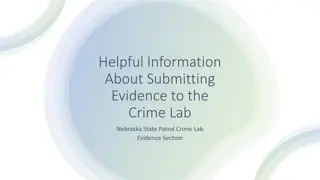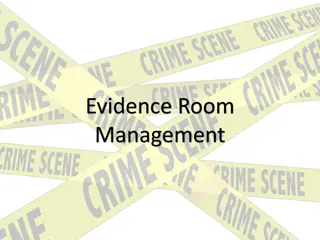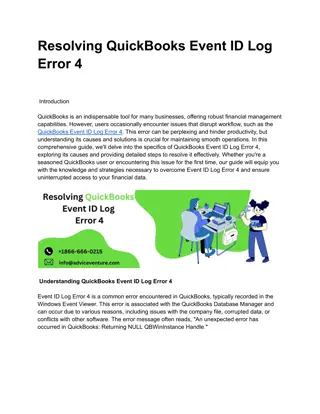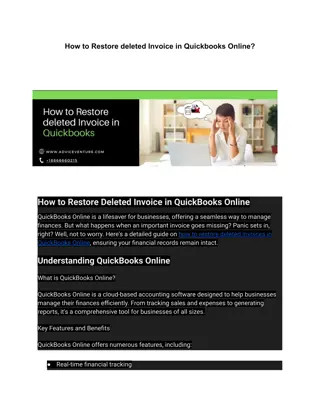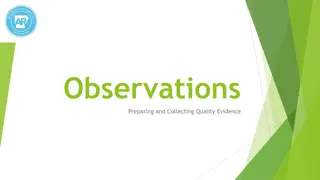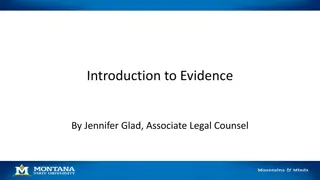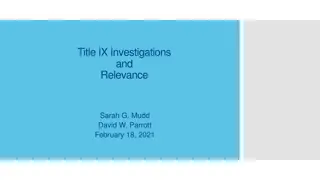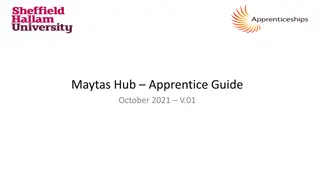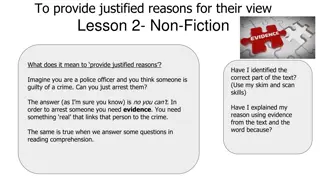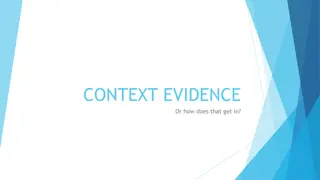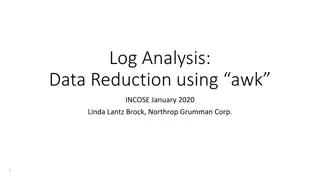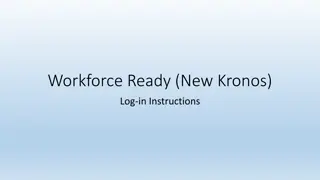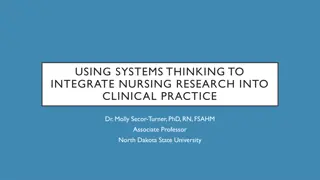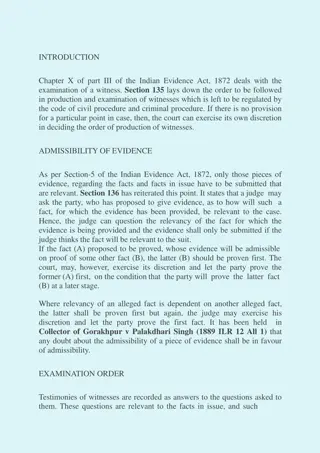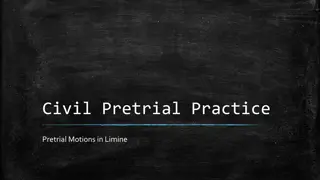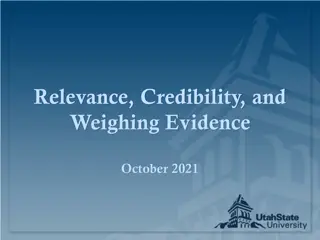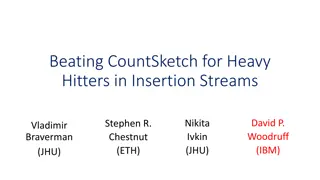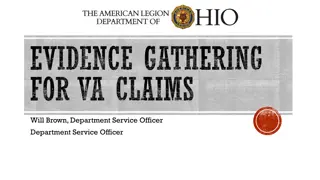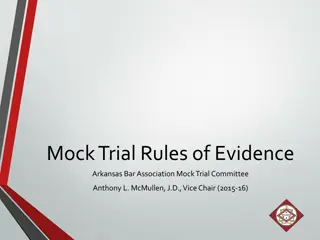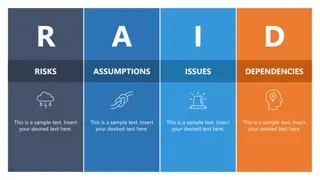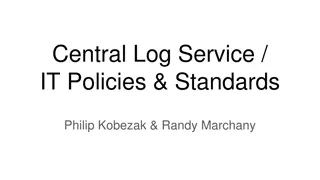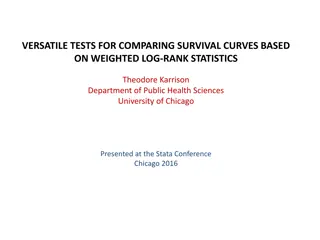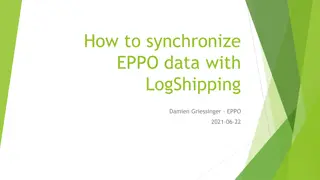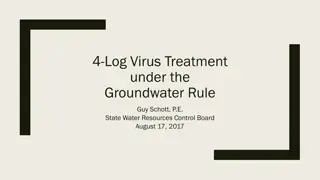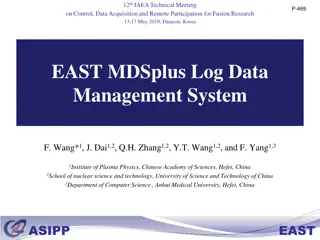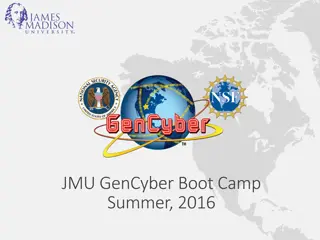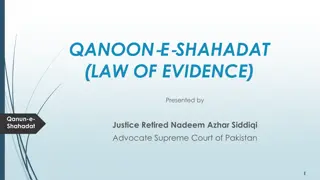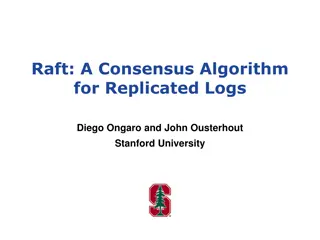The Role of Artifacts and Evidence in Educator Evaluation and Support
Exploring the role of artifacts and evidence in educator evaluation, this content covers the three categories of evidence required by the Oregon Framework. It delves into the efficient process that reduces redundancy, essential components of SLG goals, and the types of evidence relevant to professio
0 views • 15 slides
Understanding Impression Evidence Collection in CSI Investigations
Impression evidence plays a crucial role in investigations, including shoeprints, tool marks, tire tracks, bite marks, and riffling marks on bullets. This evidence can be collected in 2D using photography or tape lifts, and in 3D through casting methods. Differentiating between class and individual
0 views • 21 slides
Helpful Information About Submitting Evidence to the Crime Lab.
Helpful information about submitting evidence to the Nebraska State Patrol Crime Lab's Evidence Section. Learn about the NSP 750 Evidence Submittal Form, submission process, and guidelines for resubmissions. Ensure all necessary details are provided for proper analysis of evidence.
5 views • 16 slides
Illegally obtained evidence
Illegally obtained evidence refers to evidence acquired through unlawful means, such as searches without warrants or extraction under duress. The Fruit of the Poisonous Tree doctrine renders evidence inadmissible if derived from illegally obtained evidence. The Exclusionary Rule prohibits the use of
2 views • 30 slides
Evidence Room Management
Explore the intricacies of evidence room management in a law enforcement setting, including the roles of individuals like Greg Van Buskirk, differences in crime scene management between large and small departments, the distinction between property and evidence, the importance of maintaining chain of
0 views • 8 slides
Resolving QuickBooks Event ID Log Error 4
Learn how to resolve QuickBooks Event ID Log Error 4 with our comprehensive guide. This detailed resource provides step-by-step solutions to address this common issue, ensuring your QuickBooks functions smoothly. Discover how to identify the root causes of Event ID Log Error 4, from file corruption
1 views • 4 slides
How to Restore deleted Invoice in Quickbooks Online?
How to Restore deleted Invoices in Quickbooks Online?\nRestoring a deleted invoice in QuickBooks Online involves using the Audit Log to track and recreate it. First, access the Audit Log via the Gear icon under \"Tools\" and identify the deleted invoice details. Then, manually recreate the invoice b
1 views • 7 slides
Enhancing Evidence Collection in Education
Explore the importance of minimizing bias in evidence collection, review different types of evidence, identify strategies to collect quality evidence effectively, understand common biases affecting assessment, and learn to spot and address biased statements. Practice eliminating biased language and
0 views • 11 slides
Understanding Evidence in Investigations
Learn about the principles and types of evidence in investigations, including inculpatory and exculpatory evidence, physical, documentary, demonstrative, and verbal evidence. Explore sources of evidence and the significance of collecting relevant information to ensure a fair investigative process.
0 views • 14 slides
Understanding Title IX Investigations and the Role of Evidence Collection
The purpose of a Title IX investigation is to collect relevant evidence, both inculpatory and exculpatory, to allow for impartial decision-making regarding reported sexual harassment cases. Parties involved must receive sufficient notice and have opportunities to participate, present statements, and
1 views • 32 slides
Maytas Hub Apprentice Guide - Uploading Evidence and Mapping Process
Learn how to upload evidence and map it against Knowledge, Skills, and Behaviours (KSBs) in Maytas Hub Apprentice Guide. Follow step-by-step instructions to locate, select, and map your evidence efficiently. Enhance your Off-the-Job learning log, track progress reviews, and stay updated with notific
0 views • 18 slides
Providing Justified Reasons in Reading Comprehension
Providing justified reasons in reading comprehension involves using evidence from the text to support one's answer, similar to presenting evidence in a legal case. Just as a police officer needs evidence to make an arrest, readers need textual evidence and the word "because" to support their respons
0 views • 11 slides
Understanding Context Evidence in Legal Proceedings
Context evidence in legal proceedings refers to evidence of acts not charged in the indictment, used to provide a background for understanding specific allegations. This type of evidence is often relied upon by the prosecution to explain events or behaviors that may seem isolated or surprising. It i
1 views • 13 slides
Efficient Log Analysis and Data Reduction Using AWK
Learn how AWK and regex can streamline log analysis and data reduction tasks, saving you time and effort compared to manual methods like Excel. Discover how these tools excel at parsing columns of data, enabling advanced lexical analysis and efficient comparison of log files.
0 views • 15 slides
Workforce Ready (New Kronos) Log-in Instructions & Resources for Assistance
Comprehensive log-in instructions for Workforce Ready (New Kronos), including steps for web and mobile access, as well as resources for further assistance and training materials. Users can log in using their regular Doane credentials and follow the provided guidance. For additional help, resources,
0 views • 5 slides
Integrating Nursing Research into Clinical Practice with Systems Thinking
Dr. Molly Secor-Turner emphasizes the importance of evidence-based practice (EBP) in nursing. EBP, derived from rigorous research, leads to quality patient outcomes by aligning services with current knowledge. The process involves identifying problems, critiquing evidence, implementing recommendatio
0 views • 21 slides
Examination of Witnesses under Indian Evidence Act, 1872
Chapter X of Part III of the Indian Evidence Act, 1872, outlines the process of examining witnesses, including the order of production and admissibility of evidence. Sections 135 to 141 delve into the rules governing the examination-in-chief, cross-examination, and re-examination of witnesses, empha
2 views • 8 slides
Understanding Pretrial Motions in Limine in Civil Pretrial Practice
Pretrial motions in limine (MIL) play a crucial role in civil pretrial practice by seeking evidentiary rulings in advance to control the introduction of evidence at trial. These motions aim to prevent the admission of irrelevant, inadmissible, or prejudicial evidence and can also facilitate the intr
2 views • 17 slides
Understanding the Child Sexual Assault Evidence Scheme
The Child Sexual Assault Evidence Scheme is a significant initiative that facilitates child sexual assault trials by introducing witness intermediaries and pre-recording of children's evidence. It applies to prescribed sexual offences and mandates specific provisions for hearings and evidence presen
1 views • 16 slides
Understanding Evidence-Based Medicine and Clinical Decision-Making
European Patients Academy on Therapeutic Innovation emphasizes the importance of Evidence-Based Medicine (EBM) in providing optimum clinical care. EBM involves systematic review and utilization of clinical research for informed decision-making, benefiting patients in disease management and treatment
7 views • 20 slides
Understanding Relevance, Credibility, and Weighing Evidence in Decision-Making
Explore the importance of relevance and credibility in evidence assessment, the role of hearing panels in evaluating evidence fairly, and the responsibilities they hold. Learn about presenting relevant evidence, policy analysis, and identifying irrelevant evidence to ensure a thorough review process
6 views • 32 slides
Mastering Claims, Evidence, and Warrants for Persuasive Writing
Understanding the concepts of claims, evidence, and warrants is crucial for constructing persuasive arguments. Claims represent positions to persuade, evidence supports claims with facts, and warrants bridge the gap between evidence and claims. An exercise is outlined to help practice forming claims
0 views • 8 slides
Understanding Biased Assimilation and Attitude Polarization in Social Disputes
People with strong opinions on complex social issues tend to interpret evidence in a biased manner, accepting confirming evidence readily while subjecting disconfirming evidence to critical evaluation. This can lead to increased polarization rather than narrowing of disagreement when exposed to the
0 views • 20 slides
Transformation of Quality Assessment Framework in Healthcare
The healthcare quality assessment framework is evolving with a new strategy focused on data-led, people's experiences, care integration, and safety culture. The current framework is transitioning towards a new approach by late 2023, incorporating separate registration and monitoring processes, five
0 views • 14 slides
Advanced Techniques for Heavy Hitters Detection in Insertion Streams
Beating CountSketch algorithms, like those presented by David P. Woodruff and team, offer innovative solutions for identifying heavy hitters in insertion streams with minimal space complexity. Guarantees such as L1 and L2 outputs and the CountSketch approach are explored to achieve efficient heavy h
0 views • 18 slides
Understanding Evidence Gathering for VA Claims with The American Legion Department of Ohio
Evidence is crucial for VA claims, and it can come in various forms such as documents, written statements, photos, and video recordings. The framework for evaluating evidence includes factors like relevance, competence, credibility, and weight. Understanding the types of evidence, forms of relevance
0 views • 14 slides
Understanding Mock Trial Rules of Evidence
Mock Trial Rules of Evidence are crucial for determining the admissibility of testimony and evidence in a trial setting. Students preparing for cases need to assess evidence admissibility, make timely objections, and be prepared to defend testimony. The rules cover objections, specific objections ty
0 views • 36 slides
Comprehensive RAID Log Presentation Template
This comprehensive presentation template includes a RAID log with risks, assumptions, issues, and dependencies structured in a professional layout. Utilize this template to effectively manage project risks and dependencies. The template also features a simple RAID log slide template for a clear over
0 views • 7 slides
Central Log Service & IT Policies Overview
Central Log Service (CLS) is a university service for storing and analyzing log information, operated by the Division of IT Network Infrastructure and Services Monitoring team. The service provides a centralized location for log storage, analysis tools, and real-time indexing capabilities. IT Loggin
1 views • 7 slides
Practice and Procedure in Judicial Review: Factual Evidence and Interveners
The content provides valuable insights into the practice and procedure regarding factual evidence and interveners in judicial review cases. It covers general rules, recent cases, applications for oral evidence, questioning witnesses, opinion evidence, and the role of interveners. Key points include
0 views • 28 slides
Satchel.One Pupil Guide: Log in via the App at Knightswood Secondary School
A step-by-step guide for pupils to log in to Satchel.One (formerly Show My Homework) app at Knightswood Secondary School. Learn how to download the app, search for the school, log in via RM Unify, and enter your Glow username and password with helpful images.
0 views • 6 slides
Versatile Tests for Comparing Survival Curves Based on Weighted Log-Rank Statistics
Overview of various statistical tests for comparing survival curves beyond the traditional log-rank test. The focus is on weighted log-rank statistics sensitive to non-proportional hazards scenarios, with examples and methodologies discussed. These tests aim to provide more nuanced insights into dif
0 views • 31 slides
How to Synchronize EPPO Data with Log Shipping
EPPO provides multiple files in XML format, and it is challenging to update data in a SQLite database. Log shipping is a technique for replicating a database to another instance by copying transaction log files. Follow steps to set up log shipping on the EPPO Data services portal for efficient data
0 views • 8 slides
Understanding 4-Log Virus Treatment and Groundwater Rule Compliance
This collection of images and information delves into the importance of 4-log virus treatment under the Groundwater Rule, regulatory requirements for groundwater systems, the basics of Ct calculations for disinfection, types of disinfectants used, and understanding log inactivation of viruses. The c
0 views • 24 slides
Development of Log Data Management System for Monitoring Fusion Research Operations
This project focuses on creating a Log Data Management System for monitoring operations related to MDSplus database in fusion research. The system architecture is built on Big Data Technology, incorporating components such as Flume, HDFS, Mapreduce, Kafka, and Spark Streaming. Real-time and offline
0 views • 6 slides
Utilizing Topic Modeling for Identifying Critical Log Lines in Research
By employing Topic Modeling, Vithor Bertalan, Robin Moine, and Prof. Daniel Aloise from Polytechnique Montréal's DORSAL Laboratory aim to extract essential log lines from a log parsing research. The process involves building a log parser, identifying important log lines and symptoms, and establishi
0 views • 18 slides
Importance of Logging and Auditing in Cybersecurity
Discussing the significance of logging and auditing in cybersecurity, emphasizing the need for both a priori and a posteriori techniques to prevent security violations. Logging helps record events for system analysis, while auditing involves analyzing log records to provide understandable system inf
0 views • 32 slides
Understanding Qanun-e-Shahadat: Law of Evidence in Pakistan
Qanun-e-Shahadat Order 1984 replaced the Evidence Act of 1872 in Pakistan, aiming to align the law of evidence with Islamic principles. This law is crucial for judicial proceedings, governing the admissibility of oral and documentary evidence, primary and secondary evidence, and resolving conflicts
0 views • 22 slides
Quantum Space-Bounded Complexity in Logarithmic Space: A Comprehensive Overview
Quantum space-bounded complexity explores the memory requirements for solving problems in log space. Examples include matrix multiplication, undirected graph connectivity, and problems like inverting matrices and determining connectivity. The significance of deterministic log space (NL) and nondeter
0 views • 49 slides
Raft: A Consensus Algorithm for Replicated Logs Overview
Raft is a consensus algorithm developed by Diego Ongaro and John Ousterhout at Stanford University. It aims to ensure replicated log clients and consensus modules maintain proper log replication and state machine execution across servers. Raft utilizes leader election, normal operation for log repli
0 views • 31 slides


